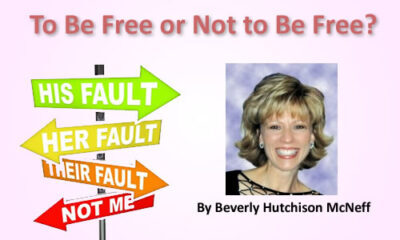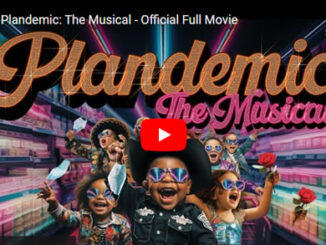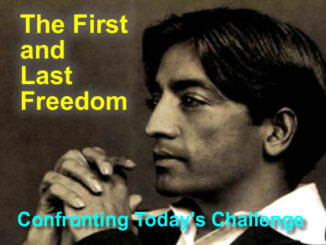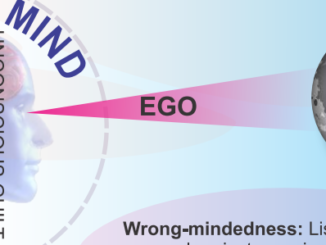
To Be Free or Not to Be Free?
(This article is reprinted by permission from The Holy Encounter, a publication of Miracle Distribution Center, Anaheim, California) www.miraclecenter.org
by Beverly Hutchinson McNeff
“To Be Free or Not to Be Free? That is the question.”
If this question were posed to us, of course we would choose freedom. After all, only a fool would want to be imprisoned! And yet, many of us walk around feeling imprisoned by time, circumstances, and a variety of other situations in our lives. Our minds have the power to impose many more limits than this world ever could, but our minds can also free us from a world of seeming limitation with merely one thought.
A Course in Miracles tells us this world is not our home. It says the world was made as an attack on God, the foremost expression of separation. This can seem rather startling, but every spiritual truth reminds us “something” has happened to distance us from our Creator. Christianity states its rendition of this “fall from grace” in a couple of different ways.
 In the Bible when it says God created the world, it’s referring to the world expressed by Eden (which represents our pre-separation state) wherein Adam (who represents our pre-separation awareness of our oneness with God) abides. And yet, when he (and Eve) ate the fruit from the tree of the knowledge of good and evil (duality or an opposite to what is all-encompassing), he was banished from (or no longer aware of) this perfect home. Even Eve, who is considered the “temptress” in this scenario, signifies a counter to the idea of our oneness by introducing male and female into the equation. As you can see, the moment perception of duality enters our minds, it continues to introduce separation upon separation until oneness and unity seem like impossible, far-away fantasies instead of our birthright.
In the Bible when it says God created the world, it’s referring to the world expressed by Eden (which represents our pre-separation state) wherein Adam (who represents our pre-separation awareness of our oneness with God) abides. And yet, when he (and Eve) ate the fruit from the tree of the knowledge of good and evil (duality or an opposite to what is all-encompassing), he was banished from (or no longer aware of) this perfect home. Even Eve, who is considered the “temptress” in this scenario, signifies a counter to the idea of our oneness by introducing male and female into the equation. As you can see, the moment perception of duality enters our minds, it continues to introduce separation upon separation until oneness and unity seem like impossible, far-away fantasies instead of our birthright.
This Old Testament rendition of the “fall from grace” is recalled by Jesus in the New Testament through the parable of the prodigal son, but with a different twist. This story gives us a clear way to return home to our Father, by releasing our guilt (through the power of forgiveness) and turning to Him. Therefore, even though this world may be a place of pain, limit, and suffering, at any moment we can choose to come home and thereby experience the peace, freedom, and limitlessness we desire and which God is holding out to us.
As you can see, the moment perception of duality enters our minds, it continues to introduce separation upon separation until oneness and unity seem like impossible, far away fantasies instead of our birthright.”
In the parable of the Prodigal Son, the son tires of the pain and suffering of the world and finally realizes he needs his father’s help. Once he moves past his shame and guilt for thinking he has abandoned his father and returns home, he doesn’t experience punishment but rather is welcomed by his father’s love and abundance. The same can be experienced by us. The Course tells us it comes by a change of mind, not a change of the world. The Course says,
“The world you see does nothing. It has no effects at all. It merely represents your thoughts. And it will change entirely as you elect to change your mind, and choose the joy of God as what you really want.” (Lesson 190)
It seems so hard for us to believe that through our choice, freedom can be experienced, but that is what the Course assures us. It tells us even though we wander in a world of loneliness and pain, God’s gifts go with us.
“Yet in his lonely, senseless wanderings [our experience of separation], God’s gifts go with him, all unknown to him. He cannot lose them. But he will not look at what is given him. He wanders on, aware of the futility he sees about him everywhere, perceiving how his little lot but dwindles, as he goes ahead to nowhere. Still he wanders on in misery and poverty, alone though God is with him, and a treasure his so great that everything the world contains is valueless before its magnitude.” (Lesson 166)
How do we escape this lonely, suffering world? How do we change our minds? How do we experience freedom and the gifts of God? It does not come by our denying the world or condemning ourselves for the choices we have made. Instead, we must look clearly (and with understanding) at the choices we have made (the compromises to love’s presence) and allow them to be transformed through the power of God’s love.
 We will never find freedom by simply turning off the television, not reading the newspaper, or running away from painful relationships, but neither does it come to us by beating ourselves up for the choices we have made or staying in an abusive environment. Healing comes as we gently take responsibility and remind ourselves there is another way, and our realization that we do not know how to find this “other way.” This not-knowing phase will allow the Answer God has given us, the Comforter, the Holy Spirit, to show us a healing solution in every challenge.
We will never find freedom by simply turning off the television, not reading the newspaper, or running away from painful relationships, but neither does it come to us by beating ourselves up for the choices we have made or staying in an abusive environment. Healing comes as we gently take responsibility and remind ourselves there is another way, and our realization that we do not know how to find this “other way.” This not-knowing phase will allow the Answer God has given us, the Comforter, the Holy Spirit, to show us a healing solution in every challenge.
The Holy Spirit only needs our willingness to let Him step in and carry us through the problems of life in such a way that we feel His peace and value it more than our suffering. Problems will still come to us, but through His Vision we will see only the loving acts or the calls for love, and our desire will be to answer in like form.
“Correction is for all who cannot see. To open the eyes of the blind is the Holy Spirit’s mission, for He knows that they have not lost their vision, but merely sleep… Christ’s eyes are open, and He will look upon whatever you see with love if you accept His vision as yours. The Holy Spirit keeps the vision of Christ for every Son of God who sleeps. In His sight the Son of God is perfect, and He longs to share His vision with you. He will show you the real world because God gave you Heaven. Through Him your Father calls His Son to remember. The awakening of His Son begins with his investment in the real world, and by this he will learn to re-invest in himself.” (T-12.4.1-9)
If we can merely hold in our minds the truth that we are God’s holy children, inheritors of His Kingdom of love and peace, then we will have begun to question the reality of a world where we are held prisoners of pain.
We will look at the wars, attacks of terrorism, and even those feuds in our personal lives and realize these are not God’s will. If it is not God’s will, then it must be our will. And, if it is our will, then it can be changed “by One Whose only purpose is your good.” (Lesson 135)
When the world seems to imprison you, when it seems like there is no hope of finding peace on the world scene or in your own personal life, perhaps you can remember these choices:
1. Invest in the real world. We are all God’s holy children. Even if we cannot understand how this is true from our current perspective of ourselves or others, let us hold in our minds the guarantee that God loves and cares for all of us. If we can hold onto this truth, we will have given the “little willingness” that is asked so that healing may reign.
The Course asks us to call upon a miracle in the midst of our challenges so we might realign our thinking with the Mind of God, the Mind we share with Him. A miracle is a shift in perception that allows us to experience the reality of God’s love that has always and will always be. This reality is present even when our willingness wanes.
In the fairy tale of the ugly duckling, even though the “duckling” tried and tried to be what he was not, his reality never changes. When he finally acknowledges he is not a duck but a swan, he sees his real beauty and actual purpose.
2. Re-invest in yourself. We are not powerless in the face of what is happening in our lives. Even if we are upset by events taking place thousands of miles away from our homes or taking place in our own backyards, we have the power to choose freedom from the fear and frustration of these occurrences. As we realize we do have control over our choice of experience (though perhaps not the outer situations), we are re-investing in ourselves. We are taking back our power of mind, our power to choose how we will react.
Dr. Viktor Frankl said, “Everything can be taken from a man but one thing: the last of the human freedoms – to choose one’s attitude in any given set of circumstances, to choose one’s own way.” Frankl experienced the Nazi concentration camps and saw his parents, brother, and pregnant wife killed, and he still held fast to this belief of life. A very devout man of God, Dr. Frankl always believed there was a purpose for our lives and that our attitude can either help or hinder us to experience God’s purpose for us. As he said, “When we are no longer able to change a situation — we are challenged to change ourselves.”
If you want to be healed from the things that bind you, realize that of yourself you do not know what to do; but, in and through the power of God, the wisdom and vision will be given you to handle every situation so only healing will result.
3. Let the Holy Spirit invest with you. Even though you must decide to choose freedom, you do not know what will bring you freedom, but the Holy Spirit does. Your job is not to judge the situations in your life, but only to decide whether or not you want to experience healing. If you want to be healed from the things that bind you, realize that of yourself you do not know what to do; but, in and through the power of God, the wisdom and vision will be given you to handle every situation so only healing will result.
I once heard a lecture by Dr. Robert Barnes who was the president of the Institute of Logotherapy. Logotherapy was developed by Dr. Frankl and is based on his view that we can choose the way we view life and that outward situations of life cannot rob us of our peace. It is not the world which must change for us to be happy, but our view of life.
Carrying on the work of Dr. Frankl, Dr. Barnes incorporated Logotherapy into his own practice. Dr. Barnes told a story of a woman who had come to him for counseling after the death of her daughter, Sally.
One day before Sally’s fourth birthday, she was run over by a car. The mother heard it happen from inside the house. She ran outside only to see her little girl lying on the ground bleeding from her eyes, nose, mouth, and ears. As she held Sally in her arms, the little girl died.
The mother came to Dr. Barnes for help because she could not get the picture of her daughter’s bleeding body out of her mind. “I see her suffering image when I close my eyes to go to sleep and when I wake in the morning. I held Sally in my arms. She couldn’t talk, but she was still breathing. Sally’s eyes looked directly into mine. I see them still — I see her bleeding body. Why did I have to see her die? Why me? Please help me,” she said, sobbing.
Dr. Barnes lovingly responded to her, “I am so sorry your precious little girl is dead. I am so sorry for your pain. But I am so thankful it was you who held your little girl in your arms in her last moments of earthly life. As she closed her eyes to this earthly experience, her last vision was not of a stranger holding her, but of her loving mother. And when she next opened her eyes, her vision was of her heavenly Father who loves her so very much, as well.”
The mother, in tears, was so grateful for this change in perception. She was freed from the pain and suffering of her mind. She had experienced freedom at last.
“Between stimulus and response there is a space. In that space is our power to choose our response. In our response lies our growth and our freedom.” — Viktor Frankl
Freedom dawns on our minds the moment we remember, “His [God’s] care for me is infinite, and is with me forever.” (Lesson 58) Between the problem and our response lies the space where our freedom is found — it is God’s infinite love.
God loves and cares for us and only wants our peace. As we recognize the choice is ours to know His Answer, we become willing to allow His vision to be given us through the Holy Spirit. He will guide us as to how we might extend His healing answer to a world crying out with pain and suffering. Freedom is a choice. Let us choose “the light of Heaven for the darkness of the world.” (Lesson 190)





Be the first to comment